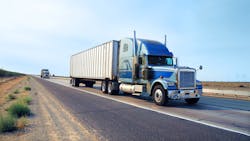We could’ve filled this month’s magazine solely with news about the novel coronavirus and the pandemic’s impact on the commercial vehicle equipment industry.
As I sit down to write this, we’ve just posted to the website a breaking story about a planned two-week shutdown at Wabash National Corp, announced in a financial release and separately in a personal note on the website from Wabash President and CEO Brent Yeagy.
“I am incredibly appreciative of how our employees, customers, suppliers, and community partners have come together to serve the life-sustaining businesses necessary to preserve our country’s public health and welfare,” Yeagy said. “We look forward to being a part of that solution again soon.”
Posted the same day, Navistar International Corp likewise provided an update on the actions it had taken, including a series of temporary cost-reduction measures such as postponements of 30% in CapEx and IT project spend; a deferral of 10-30% of the base salary of US-based, non-represented employees through the end of the year; and a reduced workweek by 20% for contractors.
On a more positive note, from the day before, CV supplier Phillips Industries reported the reopening of its California facility after a temporary 72-hour shutdown to overhaul operations in accordance with CDC guidelines.
Changes at the facility—which can serve as a good guide for all production facilities—included:
- Thorough sanitation of the facility, which takes place throughout the day to ensure a virus-free environment for all employees.
- A reconfigured production floor so employees can maintain a safe distance from one another.
- Adjustments to daily production lines throughout with less personnel density.
- Necessary safety equipment, such as gloves and facemasks, are provided.
- The production staff is an assembling of volunteers, with only those employees willing and able to work.
- The administrative staff will continue to work from home. All necessary communication technology has been made available to them so that they may support Phillips’ customer base.
“We looked at this as an opportunity to enhance our best practices and adopt the new CDC guidelines into our operations,” Rob Phillips, president and COO, said. “These are unprecedented times we are living in. The challenge for us, which we like to call ‘opportunities for improvement,’ is how this will impact future production when this pandemic slows.
“We don’t want to go back to business as usual. We’re spending this time to innovate our manufacturing processes and make permanent safety improvements to our facilities. We want to be ready for all future challenges.”
And those were just the latest important stories featured in our new section dedicated to pandemic and recovery news: trailer-bodybuilders.com/covid-19-coverage. Since the creation of the page in late March, we posted more than two dozen stories in less than three weeks about COVID-19 and the impact on our industry.
NTDA, NATM and MEMA all have taken steps to educate members on COVID-19. The web coverage also details the responses undertaken by equipment manufacturers, suppliers and distributors.
As for this month’s magazine, we’ve limited coverage of the coronavirus to just a few items. These include the analysis by the industry forecasters of FTR and their early attempt to predict what the policies designed “to flatten the curve” of COVID-19 spread would mean for the economy and truck and trailer sales.
The key takeaway: the longer the “containment phase”—or the period the economy is on hold after the initial shutdown—the slower the recovery will be.
Another story outlines the principles of “clean manufacturing,” a way to apply lean techniques to improve the workplace during the public health crisis. And we also have a look at the results of a COVID-19 survey we posted online in mid-March.
Yet there is a light at the end of the tunnel. Again, as I write this the White House is announcing its guidelines for a phased-in, state-by-state reopening of US society and commerce. Conventional wisdom says the recovery will be region by region, and economic sector by sector.
The nation, and the world, will recover. The supply chain will still need trucks and trailers, and all that work requiring vocational equipment isn’t going to disappear—because some things just can’t be done remotely, or virtually, or autonomously.
So keep an eye on the TBB COVID-19 page for the latest, and don’t hesitate to drop us a line to share how your company is working through the challenges of such unusual times. Most of all: Stay safe.
About the Author
Kevin Jones
Editor
Kevin has served as editor-in-chief of Trailer/Body Builders magazine since 2017—just the third editor in the magazine’s 60 years. He is also editorial director for Endeavor Business Media’s Commercial Vehicle group, which includes FleetOwner, Bulk Transporter, Refrigerated Transporter, American Trucker, and Fleet Maintenance magazines and websites.
Working from Beaufort, S.C., Kevin has covered trucking and manufacturing for nearly 20 years. His writing and commentary about the trucking industry and, previously, business and government, has been recognized with numerous state, regional, and national journalism awards.

